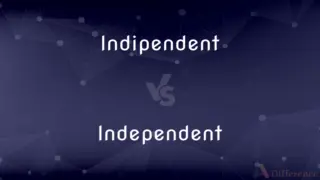Platypi vs. Platypuses — Which is Correct Spelling?
By Tayyaba Rehman & Maham Liaqat — Updated on April 25, 2024
Platypi is the incorrect spelling of platypuses, which refers to the plural form of platypus, a semi-aquatic mammal native to eastern Australia.

Table of Contents
Which is correct: Platypi or Platypuses
How to spell Platypuses?

Platypi
Incorrect Spelling

Platypuses
Correct Spelling
ADVERTISEMENT
Key Differences
"Platypi" might sound correct due to other plurals like "cacti," but "platypus" is not a Latin word, so it does not use the Latin pluralizing form "i."
The suffix "puses" in "platypuses" reflects the standard English pluralization, similar to "octopuses."
"Platypus" ends in "us," but not all such words follow the Latin plural rule (like "bus" to "buses").
How Do You Spell Platypuses Correctly?
Incorrect: The guide mentioned that platypi are very shy animals.
Correct: The guide mentioned that platypuses are very shy animals.
Incorrect: He saw several platypi swimming in the river.
Correct: He saw several platypuses swimming in the river.
ADVERTISEMENT
Incorrect: In the zoo, the platypi seemed very active today.
Correct: In the zoo, the platypuses seemed very active today.
Incorrect: She wrote an essay on the habitats of platypi.
Correct: She wrote an essay on the habitats of platypuses.
Incorrect: Many people mistakenly refer to multiple platypus as platypi.
Correct: Many people mistakenly refer to multiple platypus as platypuses.
Platypuses Definitions
A mammal with a duck-like bill, webbed feet, and a flat tail, native to Australia.
Platypuses are one of the few mammals that lay eggs.
An aquatic creature known for its electrolocation abilities.
Platypuses can detect prey by sensing electrical signals in the water.
Featured on the 20-cent coin in Australia; symbol of the continent’s unique wildlife.
Platypuses represent Australia’s diverse and unique ecological heritage.
Subject of scientific study due to its unusual characteristics among mammals.
Platypuses are often studied to understand evolutionary biology.
The only mammal that produces venom; found in the male's hind spurs.
Male platypuses have venomous spurs that can deliver a painful sting.
A semiaquatic egg-laying mammal (Ornithorhynchus anatinus) of eastern Australia and Tasmania, having a broad flat tail, webbed feet, a snout resembling a duck's bill, and in the male, venomous spurs on the hind legs. Also called duckbill, duck-billed platypus.
Plural of platypus
Platypuses Meaning in a Sentence
Platypuses are nocturnal, hunting mostly at night.
Young platypuses are fed with milk from their mother.
Platypuses close their eyes and ears when underwater.
Platypuses have been featured in various documentaries.
Observing platypuses in the wild requires patience and silence.
Platypuses do not have stomachs; their gullet leads directly to their intestines.
Many platypuses live in Tasmania and Queensland.
Common Curiosities
How do we divide platypus into syllables?
Platypus is divided into syllables as plat-y-pus.
How many syllables are in platypus?
Platypus has three syllables.
What is a stressed syllable in platypus?
The first syllable is stressed in platypus.
How is platypus used in a sentence?
The platypus is known for its distinctive appearance and unusual behaviors.
What is the root word of platypus?
The root word of platypus is "platypus," derived from Greek.
What is another term for platypus?
There is no widely accepted synonym for platypus.
Why is it called platypus?
The name "platypus" comes from the Greek words "platys," meaning flat, and "pous," meaning foot, referring to the animal’s flat-footed appearance.
What is the opposite of platypus?
There is no direct opposite of platypus as it is a specific animal species.
Is platypus an adverb?
No, platypus is not an adverb.
What is the singular form of platypus?
The singular form is platypus.
Is platypus a noun or adjective?
Platypus is a noun.
What is the verb form of platypus?
Platypus does not have a verb form as it is a noun.
What is the pronunciation of platypus?
Platypus is pronounced as /ˈplætɪpəs/.
What part of speech is platypus?
Platypus is a noun.
Is platypus an abstract noun?
No, platypus is not an abstract noun; it is a concrete noun.
Is platypus a negative or positive word?
Platypus is neutral; it is neither inherently negative nor positive.
Which vowel is used before platypus?
Vowels like "a" (an) can be used before platypus when it begins a sentence or follows a vowel sound.
Is platypus a collective noun?
No, platypus is not a collective noun.
Is the word “platypus” a Direct object or an Indirect object?
Platypus can be used as a direct object in a sentence.
Which article is used with platypus?
The articles "the" and "a" are used with platypus, depending on the context.
What is the plural form of platypus?
The plural form is platypuses.
Is platypus a vowel or consonant?
Platypus is a noun and thus neither a vowel nor a consonant.
Is the platypus term a metaphor?
Platypus is not typically used as a metaphor.
Which determiner is used with platypus?
Determiners like "the" or "a" are used with platypus.
Which preposition is used with platypus?
Prepositions such as "in" (in Australia) or "of" (the diet of the platypus) are used with platypus.
Is platypus a countable noun?
Yes, platypus is a countable noun.
Is the word platypus imperative?
No, as a noun, platypus cannot be imperative.
Is the word platypus a Gerund?
No, platypus is a noun and not a gerund.
Which conjunction is used with platypus?
Conjunctions like "and" or "but" can connect sentences involving the word platypus.
Share Your Discovery

Previous Comparison
Bearly vs. Barely
Next Comparison
Joy vs. JoynessAuthor Spotlight
Written by
Tayyaba RehmanTayyaba Rehman is a distinguished writer, currently serving as a primary contributor to askdifference.com. As a researcher in semantics and etymology, Tayyaba's passion for the complexity of languages and their distinctions has found a perfect home on the platform. Tayyaba delves into the intricacies of language, distinguishing between commonly confused words and phrases, thereby providing clarity for readers worldwide.
Co-written by
Maham Liaqat







































